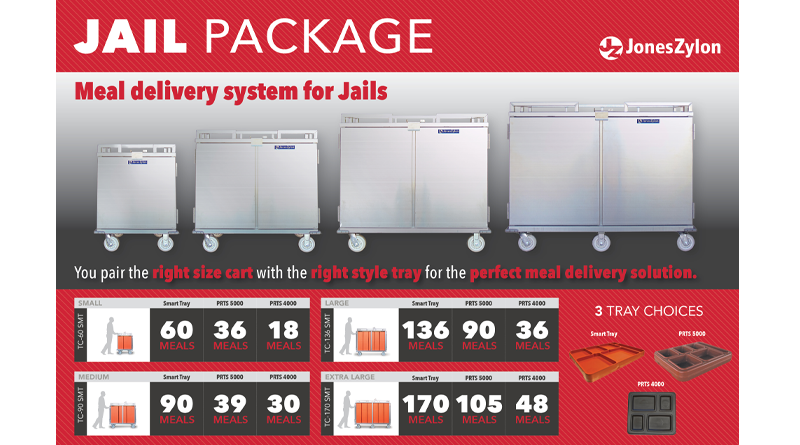Getting Small Pays Off Big for Correctional Food Service Systems
By CN Staff
CN recently touched base with a pair of industry leaders in corrections food service, to get their take on what’s new with meal delivery in the wake of COVID’s impact. What might come as a surprise to some is that the pandemic’s problems have prompted opportunities for both firms to grow their business bigger—but in small ways.
JonesZylon Zips Out New System
JonesZylon has introduced a new line of meal delivery systems focused on jails and smaller institutions, and we checked in with President Robert Zachrich for some of the details.
Can you give us a nutshell overview of the new concept?
The smaller facilities can serve meals faster and can often get away with using ambient carts instead of heated carts. We have paired a small/medium/large/X-large carts family with options of three different meal trays that come free with the cart. They are lockable aluminum enclosed carts.
When was this new meal delivery system unveiled and what prompted its inception?
Spring 2021—Prompted because there was a need for small to mid-size jails to have an all-in-one affordable package (cart plus trays) with the high end correctional security features but not necessarily the need for trays in heated carts. These aluminum carts with included trays fit their budgets and yet are safe and durable enough to meet their needs.
What type of correctional facilities are best suited for the new system?
Typically Jails with population less than a couple hundred that can get the meals delivered in 15-20 minutes.
What kind of feedback have you heard from some of the facilities using the new meal delivery system?
Many of these facilities used to use open carts and would be frustrated by trays sliding off and losing meals, so they are thrilled with the enclosed correctional carts that allow for convenient delivery of the meals. They like this ‘packaged’ offering so they can get the right trays paired with the right carts for their application.
In what ways do you think the new meal delivery system is a boon to facility staff as well as inmates?
The Staff can have a greater peace of mind that meals will not be tampered with or spilled during transport and because the carts are sized appropriately for the amount of inmates that are being served. They aren’t pushing around carts that are too big or making multiple trips with carts that are too small to feed their population.
What has this meant to JonesZylon in terms of possible company growth and greater market opportunities?
We have spent many years focused on larger facilities, primarily in the state and federal prison system, but this allows us to meet the needs of smaller jails and counties with tighter budget constraints than we could previously.
Aramark Innovates
Aramark, another leader in the field, has also made innovations in response to covid, according to Heather G. Dotchel, Corporate Communications.
“Similar to nearly every industry, correctional trends have been highly influenced by the pandemic,” Dotchel remarked to CN. “We’ve found the most significant trends and innovation revolve around safety for our correctional communities. Whether administration, officers, inmates or visitors, cleaning of surfaces and high-touch areas like kiosks are just as important as wearing the proper PPE. Throughout the pandemic,
Aramark has supplied clients with various PPE and cleaning supplies free of charge. Contactless payment with staff dining and micromarkets has become a priority to create a better customer experience, with the added benefit of minimizing germ spread. In food service, many clients have removed salad bars in favor of prepackaged salads and sandwiches for officers, while inmate dining has seen accommodation for individually packaged condiments, smallwares, etc.”
Pandemic needs have also inspired opportunity for innovation, said Dotchel.
“We’ve developed new processes in food preparation and service to account for limited facility movement and face-to-face interaction. Our service models have become more nimble, adjusting service to comply with rapidly changing federal, state and local mandates, and aiding self-operated accounts struggling to procure food and products by leveraging our networks to meet needs.”
Aramark has also seen a growing need for expanded solutions for officers and staff; and by adding convenience retail at some facilities, they have been able to provide a one-stop shop for essential items, that allows officers to pick up items needed for home—without adding an extra errand stop–once their shift is over.
Editor’s Note: This article originally appeared in the January/February 2022 issue of Correctional News.

